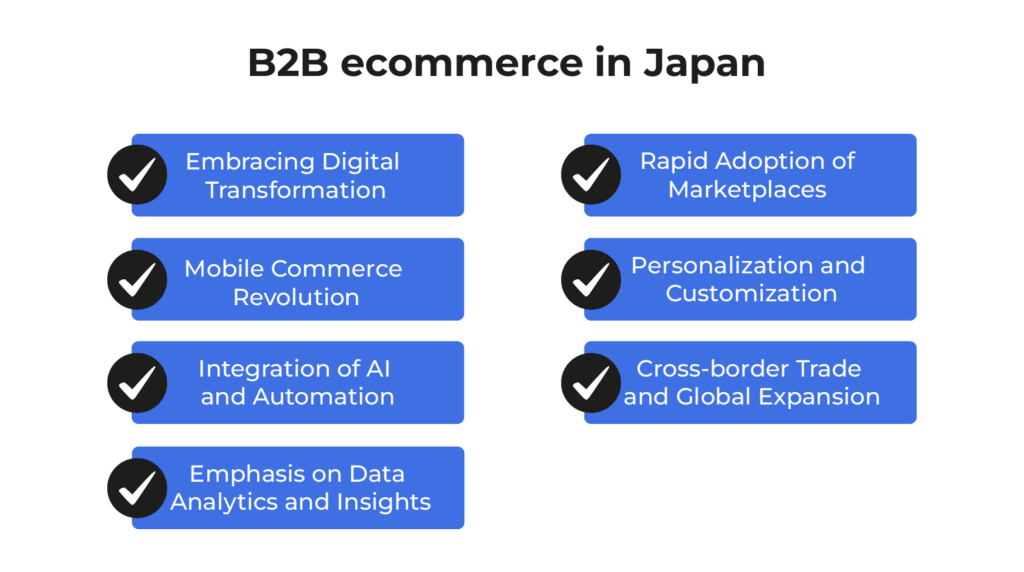Japan is the world’s fourth largest ecommerce market, after only China, the United States, and the United Kingdom. It has grown year after year, with demand only increasing since the epidemic began.
Ecommerce is a terrific strategy to contact Japanese customers since more people are buying and selling online. 93% of Japanese people have an internet connection, while 75% of Japanese people make online transactions.
The increased impetus for digital transformation and operational efficiency is one of the causes for the rise of the B2B ecommerce industry over the last 5 years. B2B ecommerce has been shown to increase efficiency and sales, which is why so many companies have adopted it.
Table of Contents
B2B ecommerce in Japan
In recent years, Japan has witnessed a significant transformation in its business landscape, particularly in the realm of B2B ecommerce. As the third-largest economy globally, Japan has always been at the forefront of technological advancements and innovation. Today, the country’s B2B ecommerce sector is experiencing a surge, driven by digital transformation, changing consumer expectations, and the increasing adoption of new technologies.
In this blog post, we will delve into the fascinating world of B2B ecommerce trends in Japan, exploring the key factors contributing to its growth and the future prospects it holds.
Embracing Digital Transformation
The rise of B2B ecommerce in Japan can be largely attributed to the digital transformation initiatives undertaken by businesses across various industries. Traditional business models are gradually giving way to digital platforms, allowing companies to streamline their operations, reduce costs, and enhance customer experiences. Japanese businesses are recognizing the importance of digitalizing their processes, from procurement and supply chain management to online marketing and customer support.
Rapid Adoption of Marketplaces
B2B marketplaces are gaining tremendous popularity in Japan, enabling businesses to connect, collaborate, and transact on a single platform. These marketplaces provide a wide range of products and services, catering to different industries, and offer a convenient and efficient way for buyers and sellers to conduct business. Companies can leverage these platforms to expand their reach, discover new suppliers, and find innovative solutions to their business needs.
Mobile Commerce Revolution
Japan has been at the forefront of the mobile revolution for years, and this trend has extended to B2B e-commerce as well. With a highly tech-savvy population and widespread smartphone usage, mobile commerce is becoming increasingly prevalent in the B2B space. Japanese businesses are developing mobile apps and optimized websites to facilitate seamless transactions, allowing buyers and sellers to connect anytime, anywhere.

Personalization and Customization
The demand for personalized and customized products and services is growing among B2B buyers in Japan. Businesses are leveraging technology to provide tailored solutions, taking into account the unique requirements of their customers. From product configuration tools to personalized pricing and delivery options, companies are focusing on enhancing the customer experience by offering personalized experiences that meet specific needs.
Integration of AI and Automation
Artificial Intelligence (AI) and automation technologies are revolutionizing B2B e-commerce in Japan. Companies are utilizing AI-powered tools for demand forecasting, inventory management, and customer support. Chatbots and virtual assistants are being deployed to provide instant and personalized assistance to customers, improving response times and overall efficiency. Automation is streamlining repetitive tasks, freeing up valuable time for employees to focus on more strategic activities.
Cross-border Trade and Global Expansion
B2B e-commerce is enabling Japanese businesses to expand their reach beyond domestic markets. E-commerce platforms and marketplaces are facilitating cross-border trade, allowing companies to connect with international suppliers and buyers. By embracing global trade opportunities, Japanese businesses can tap into new markets, access a diverse range of products and services, and foster international collaborations.
Emphasis on Data Analytics and Insights
Data-driven decision making is becoming increasingly important in the B2B e-commerce landscape. Japanese businesses are leveraging analytics tools and platforms to gain valuable insights into customer behavior, market trends, and performance metrics. By analyzing this data, companies can optimize their operations, refine their strategies, and deliver enhanced customer experiences.
The B2B e-commerce landscape in Japan is experiencing a significant transformation, driven by digitalization, technological advancements, and changing consumer expectations. Businesses are embracing digital transformation initiatives, adopting marketplaces, and leveraging mobile commerce to enhance their operations and reach a wider customer base. Personalization, AI, and automation are revolution

How to succeed in the Japanese B2B ecommerce market
There are a number of things that businesses can do to succeed in the Japanese B2B ecommerce market. These include:
- Partner with a reputed B2B ecommerce platform such as Cloudfy: Partnering with a local B2B ecommerce platform can help businesses to gain access to a wider audience of potential customers. It can also help businesses to navigate the complex Japanese business landscape.
- Offer competitive prices: Businesses need to offer competitive prices in order to be successful in the Japanese B2B ecommerce market. This is due to the fact that Japanese businesses are very price-conscious.
- Provide excellent customer service: Japanese businesses place a high value on customer service. Businesses need to provide excellent customer service in order to build relationships with potential customers and to retain existing customers.
- Market your products and services effectively: Businesses need to market their products and services effectively in order to reach a wider audience of potential customers. This can be done through a variety of channels, such as online advertising, email marketing, and social media marketing.
The Japanese B2B ecommerce market is a rapidly growing market with a lot of potential. Businesses that are able to successfully navigate the market can reap significant rewards.
In today’s digital age, physical distance or the size of your company no longer matters. We can connect online from anywhere and deliver a robust B2B ecommerce platform to meet your needs. Schedule a demo now to know more!
Frequently Asked Questions
The growth of B2B ecommerce in Japan is driven by factors such as:
- Digital transformation initiatives
- Changing consumer expectations
- Rapid adoption of marketplaces
- Mobile commerce revolution
- Personalization and customization
- Integration of AI and automation
- Cross-border trade
- Emphasis on data analytics.
Embracing digital transformation allows businesses to streamline operations, reduce costs, enhance customer experiences, and digitalize processes such as procurement, supply chain management, online marketing, and customer support.
B2B marketplaces are gaining popularity in Japan as they provide a convenient and efficient platform for businesses to connect, collaborate, and transact.
They offer a wide range of products and services, cater to different industries, and help companies expand their reach, discover new suppliers, and find innovative solutions.
Mobile commerce is highly prevalent in Japan, driven by its tech-savvy population and widespread smartphone usage. Businesses are developing mobile apps and optimized websites to facilitate seamless transactions, allowing buyers and sellers to connect anytime, anywhere.
Businesses are leveraging technology to provide tailored solutions, considering the unique requirements of their customers. This includes using product configuration tools, personalized pricing and delivery options, and focusing on enhancing the customer experience by offering personalized experiences that meet specific needs.

Get Your Free Guide – Top 10 Reasons Cloudfy is the Solution for B2B Ecommerce in a Recession
If You are Struggling with B2B ecommerce during a recession? And, want to know the Top 10 reasons why Cloudfy is the solution? Check here! Cloudfy is the appropriate answer for B2B e-commerce companies battling to stay afloat during a … Read More

How your B2B ecommerce website can be optimized for mobile device
Your business to business (B2B) ecommerce website needs to be optimized for mobile devices. Your customers now regularly use ten or more channels when interacting with their suppliers. That’s up from five in 2016. Some or even all of these … Read More

Meeting Compliance Standards with B2B Ecommerce Software
You’ll need to meet international compliance standards when you’re selling globally from your business to business (B2B) ecommerce platform. This might include taxes, legislation and data protection requirements. For example, Gartner predicts three-quarters of the world will be covered by consent requirements … Read More






